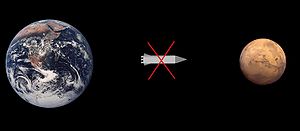Difference between revisions of "Independence from Earth"
| Line 18: | Line 18: | ||
==Political== | ==Political== | ||
| − | Only few people on Earth are really interested in space travel. Hence, the state's budget for space projects is small. In case the support from Earth stops some day due to political issues, the settlers | + | Only a few people on Earth are really interested in space travel. Hence, the state's budget for space projects is small. In case the support from Earth stops some day due to political issues, the settlers might be completely on their own. So it is better to be independent, and at the same time reduce costs so these are politically acceptable on Earth. So independence is a Win-win process. |
==Sociological== | ==Sociological== | ||
Revision as of 10:28, 1 August 2024
The construction and realization of colonies on Mars is much simpler when combined with in situ production of goods, and much less expensive. Local production can help to gain Independence from Earth, and is probably essential regarding food, energy, materials and breathable air.
Financial
- Transportation from Earth to Mars is very expensive. Unless new technologies come along, transportation costs will remain in the order of a minimum of 140$/kg, and may well be anywhere up to 500$ per kg if volumes are low.
- The Cost of energy on Mars for an early settlement might range widely, depending on technology. For a average cost of 100$/GJ, or 0,1$ per MJ, the Embodied energy tables can serve to calculate costs for local production of goods. These need to be corrected using suitable multipliers for work and distribution.
- A multiplier of 3 is suggested here. With such a multiplier:
- Water on Mars might cost 0,5 x 3 x 0,1 = 0,15$/kg, air might be in the range of 0,3$ per kg.
- Steel might be 10$ per kg
- Food might be 1300 x 3 x 0,1 = 390$/kg. This would be one of the most expensive large volume items on Mars, and for short stays, it's probably cheaper to bring the food than to produce it on site. However, for longer term stays, the investment of means to produce food from Martian resources is cheaper for a settlement.
Technological
There is a technological risk of failure in the transport from Earth to Mars. In case the colony is not independent the logistics chain is vital for survival of the settlers. Any failure during transport can lead to a fatal shortage on food.
Energy is hard to store, and hence can not be brought to Mars in large amounts, except perhaps as nuclear fuel.
Political
Only a few people on Earth are really interested in space travel. Hence, the state's budget for space projects is small. In case the support from Earth stops some day due to political issues, the settlers might be completely on their own. So it is better to be independent, and at the same time reduce costs so these are politically acceptable on Earth. So independence is a Win-win process.
Sociological
People like the idea to have their fate in their own hands. The motivation to set up a settlement with the ability to thrive indefinitely is great.







